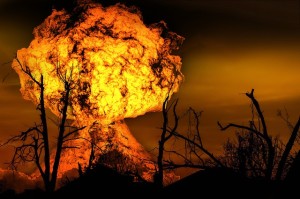I would guess that most readers don’t really want to analyze the stories they read; they just want to sink into them and enjoy them. I don’t know anyone who deliberately chooses a book based on whether it’s a plot-based story or a character-based story. So what’s the difference and why does it matter?

A plot-driven story is, generally speaking, about an ordinary person in an extraordinary situation. H. G. Wells’ War of the Worlds is a plot-based story. It’s about a very average Englishman who suddenly finds himself in the unfathomable situation of dodging Martians bent on human destruction. The man is forced to make his way across a war-torn land, struggling to avoid the Martians, help others if he can, and find a way to survive. The man himself could be any man or everyman. In this kind of story, the exterior action affects and drives the interior struggle of the character, his emotions and decisions.
A character-driven story is quite different. It’s more about an extraordinary person who may live in very ordinary conditions. The conflict in a character-based story is almost always internal, yet it drives the exterior action. Robert Louis Stevenson’s Dr. Jekyll and Mr. Hyde is a character-based story about a very unusual man (or men) whose very nature sets the stage for conflict. Dr. Jekyll must deal with his own emotions at the same time as he is dealing with the consequences of Mr. Hyde’s actions.
In a recent discussion of a plot-driven book with a friend, I mentioned the emotional character arc (or lack thereof) and my friend asked, “Isn’t that only in a character-driven book?” Well, yes and no.
Although each type of story relies largely on a certain kind of action — exterior action in a plot-based story and interior action in a character-based story — both types contain at least the possibility of the two separate layers of story arcs. What I find lacking in so many plot-based books is the arc of the protagonist’s emotional growth, particularly in series. I’ve recently read a few books in an action/adventure series, and while I’ve enjoyed the stories, I’ve realized that they have very little soul to them. They remind me of a season of hour-long TV dramas where the main character starts out at the top of the hour, searches out or is drawn into a mystery, intrigue or conflict, solves the conflict (but not without setbacks and surprises) and finishes the hour emotionally as the same character he was when it started, ready to begin the next installment. While the main character may learn things along the way about his adversary, a secret group, maybe little-known history, he does not, usually, learn much new about himself. The whole point of the show is to bring the character full circle so he can reset and start at ground zero for the next episode.
Granted, someone who is looking for the latest James Bond novel (by whomever) and not finding it is probably not going to default to Louisa May Alcott or Jane Austen. Okay, I get that. But there’s no rule that says a plot-based action/adventure can’t have some emotional growth along the way. I tend to think that the more layers a story has, the more interesting it is. What do you think? Am I asking too much? Is it enough just to have a roller coaster ride? Or do you like your characters with a dash of insight, as well?
Originally published by Indies Unlimited on March 3, 2015.

No comments:
Post a Comment